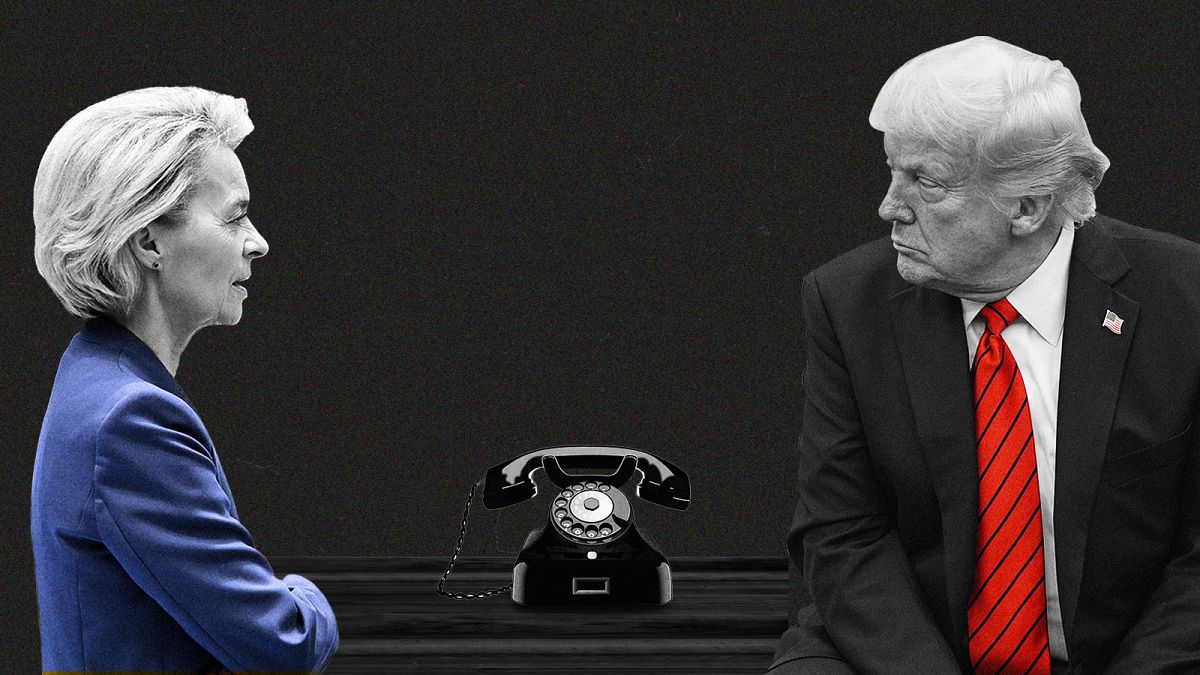Introduction: A Critical Moment for Transatlantic Trade
The relationship between the United States and the European Union has always faced complex challenges. However, as trade talks intensify, a new obstacle has emerged a deafening silence between European Commission President Ursula von der Leyen and former US President Donald Trump. This lack of communication now casts a long shadow over already delicate negotiations. As both sides prepare for crucial decisions, the world watches closely to see whether cooperation or confrontation will define the future.
Background: A History of Tension and Cooperation
Historically, the EU and the US have built a robust trade partnership based on mutual economic interests. Despite occasional disputes, such as the Boeing-Airbus subsidies battle and tariffs on steel and aluminum, dialogue usually helped resolve disagreements. During Trump’s presidency, however, relations cooled significantly. Trump often criticized the EU, calling it a “foe” in trade and imposing tariffs that strained transatlantic ties.
Meanwhile, von der Leyen, who took office in December 2019, sought a fresh start. She emphasized dialogue, green cooperation, and technology partnerships. Yet, with Trump prioritizing an “America First” agenda, her outreach efforts fell flat. Their interactions remained limited, and personal rapport never developed. This historic frostiness now re-emerges as a major hurdle.
Current Situation: A Deafening Silence
Today, the absence of meaningful communication between von der Leyen and Trump significantly complicates trade talks. Trump, who is actively campaigning for a return to the White House, signals that his future policies could revert to aggressive tariffs and protectionist measures. Meanwhile, von der Leyen must navigate not only internal EU politics but also an unpredictable American landscape.
Unlike her predecessors, von der Leyen cannot rely on back-channel diplomacy or personal influence with Trump. Trade officials on both sides admit privately that the lack of trust and familiarity slows progress. As a result, negotiators struggle to find common ground on vital issues such as digital taxation, agricultural trade, and climate-related tariffs.
Moreover, with Trump’s political resurgence, European leaders fear another disruptive era of U.S. trade policy. Without active engagement between von der Leyen and Trump, both sides risk sliding back into a cycle of tariffs and retaliations.
Key Issues at Stake: What Silence Threatens
The current void in leadership dialogue threatens several critical areas:
1. Digital Trade
The EU has pushed for global rules on digital services, data privacy, and online taxation. Trump’s administration, however, opposed many of these initiatives, accusing Europe of targeting American tech giants unfairly. Without renewed conversations, digital trade could become a flashpoint again.
2. Green Subsidies and Climate Cooperation
Von der Leyen champions the European Green Deal, which introduces strict environmental standards. She seeks cooperation with the U.S. on green technology subsidies. Trump, who rolled back environmental regulations during his presidency, shows little interest in aligning with EU climate goals. The silence between the two leaders hampers any potential progress.
3. Industrial and Agricultural Goods
Agricultural subsidies, car tariffs, and manufacturing standards remain perennial issues. Trump previously threatened tariffs on European cars, a move that deeply alarmed German manufacturers. With no open lines of communication, misunderstandings and escalations seem almost inevitable.
The Broader Impact: A Fragile Transatlantic Alliance
Beyond economic consequences, the silence affects broader geopolitical dynamics. A strong EU-U.S. partnership is crucial for addressing challenges from China’s economic rise, Russian aggression, and global regulatory leadership. Failure to strengthen trade relations could weaken the entire transatlantic alliance.
Additionally, other world powers closely observe these tensions. China, in particular, may exploit any EU-U.S. rift by expanding its influence in Europe and globally. Therefore, the stakes extend far beyond trade; they touch the very fabric of international order.
Possible Solutions: Breaking the Silence
Despite these challenges, opportunities still exist to reverse course. Several steps could help:
-
Direct Engagement: Von der Leyen should seek direct meetings or high-level channels to open discussions with Trump’s camp.
-
Clear Strategy: The EU must prepare a unified, flexible strategy that can adapt to Trump’s unpredictable style if he returns to office.
-
Alliances with U.S. States: Building relationships at the state level, especially with governors and local officials, could create alternative pathways for cooperation.
-
Leveraging Business Communities: European and American industries could pressure both leaders to maintain stable trade relations.
Ultimately, silence must not define the future. Only proactive engagement and a clear-eyed assessment of risks and opportunities can preserve a vital transatlantic partnership.
The Price of Silence
The lack of dialogue between Ursula von der Leyen and Donald Trump already exerts a powerful, destabilizing influence over trade talks. Without urgent efforts to bridge the gap, both the EU and the U.S. face serious economic and geopolitical consequences. History teaches that communication, even between adversaries, remains essential. Therefore, leaders on both sides must act swiftly to ensure that silence does not give way to conflict.




